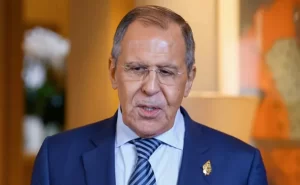“War in Europe rarely started on Wednesday.”
That’s how a Russian diplomat brushes speculation in the West that Russia can attack Ukrainian neighbors as soon as Wednesday, February 16.
As M. and other NATO members warn the potential for destructive war, Russia did not fight the olive bomb or branch – but with sarcasm.
This is a tool that officials in Moscow have long been used to surpass their rivals and to respond to the attention of actions that are seen as threatening to Western or Russian neighbors. Laconic Qippsion Doveip with the domestic agenda of the Kremlin by making Russia and a very strong president look cooler and more clever than countries in the West, West Democrats.
Because worries mushroomed that Wednesday could be the day of President Vladimir Putin launched an invasion to Ukraine, Russian officials closed them.
At the Facebook post, Foreign Ministry spokesman Maria Zakharova asked “mass media disinformation” in the West “to reveal our ‘invasion’ schedule for the coming year. I want to plan my vacation.”
“For regret a lot of Western media, the war failed to start,” Zakharova said at the briefing on Wednesday. “The battle has erupted on their yard, but has nothing to do with reality.”
Ukraine, meanwhile, has lived amid signs of possible invasions for several weeks, with around 150,000 Russian troops around most of their countries for military training. Russia said this week began to pull back several troops, but Western military officials said there was no evidence of serious withdrawal.
The Russian Ambassador to the European Union, Vladimir Chizhov, accused the Western “slander” because he accused the invasion of being happening. He insisted on an interview with the German Daily Welt newspaper that “there will be no attack on this Wednesday.”
Then Chizhov added: “War in Europe rarely started on Wednesday. ‘”
The statement seemed more than significantly historically. World War I began on Tuesday and World War II began in Europe on Friday, but the history of the European war for centuries included conflicts that began throughout the week.
Kremlin’s spokesman Dmitry Pescov also took Western fears lightly. Asked on Wednesday whether the Russian President’s government operated differently overnight, he told reporters that everyone sleeps calmly and returned to work in the morning as usual.
“Western hysteria is still far from its peak,” Peskov said. “We need to be patient, because the remission will not come quickly.”
The Master of Diplomatic SnarK Russia is the Minister of Foreign Affairs Sergey Lavrov. He is known throughout the world for his QIPS – often said in English – more than 18 years as a Top Kremlin diplomat.
On Wednesday, Lavrov mocked the west sadly “did not have a basic care” because it tried to dictate or predict the Russian plan.
Under Sarcasm, Russia has narrated the current Ukrainian crisis from the start: First of all by transferring troops to Ukraine, then by regularly extended the possibility of diplomatic solutions, keeping foreign officials and global markets on the constant edge.
While Putin offers more talks this week, his intention in Ukraine remains unclear. Western intelligence shows such invasions can still occur – on Wednesday in the future or every day of the week.






